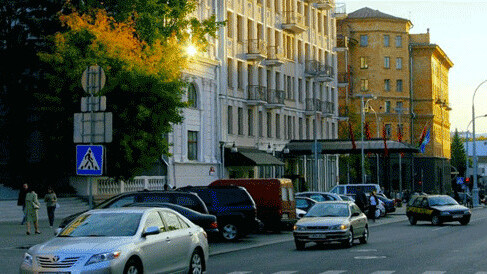
According to the US Library of Congress, the Republic of Belarus has just recently published a law making it illegal for Belarusian citizens and residents to access and/or use foreign websites (particularly for commercial purposes). Violations of the law are recognized as a misdemeanor and can result in a charge of up to $125.
The law requires companies and individuals that are registered as entrepreneurs to only use domestic domains for providing online services, conducting sales, or exchanging email messages. This likely means that domain holders with any connection to outside services will have to forfeit their domains.
The law begins on January 6, completely destroying the benefits an open Web can have on the economy and quality of life for citizens. From the LoC:
It appears that business requests from Belarus cannot be served over the Internet if the service provider is using online services located outside of the country. The tax authorities, together with the police and secret police, are authorized to initiate, investigate, and prosecute such violations.
Additionally, the Law states that the owners and administrators of Internet cafés or other places that offer access to the Internet might be found guilty of violating this Law and fined and their businesses might be closed if users of Internet services provided by these places are found visiting websites located outside of Belarus and if such behavior of the clients was not properly identified, recorded, and reported to the authorities. The Law states that this provision may apply to private individuals if they allow other persons to use their home computers for browsing the Internet.
The law serves in complete contrast to a new Malaysian law, which requires restaurants in Kuala Lumpur (the largest city in Malaysia) to have Wi-Fi. Instead of attempting to increase connectivity, the Belarusian Government is clearly trying to assert complete control over the Internet.
It’s noteworthy that the law now authorizes the government to establish a blacklist of websites to be blocked by ISPs. Content such as pornographic websites and anything that contains content of an “extremist nature” will be blocked.
More from the LoC:
Commentators believe that these measures will lead to outside websites blocking access from Belarus. For example, suppose someone in Belarus buys something from Amazon, which is not a Belarusian company and thus is not registered in Belarus. The transaction is illegal, and so the Belarusian Attorney General would send a note to Amazon informing it that it is violating national law and might be sued.
The law, which is a pure regression, shares many overtones and practical functions with the much maligned SOPA bill here in the United States. And like SOPA, the Belarusian law will stifle innovation and plague its economy.
Edit: I’d like the opportunity to emphasize this quote from the LoC, and then elaborate on the law:
…places that offer access to the Internet might be found guilty of violating this Law… if users of Internet services provided by these places are found visiting websites located outside of Belarus and if such behavior of the clients was not… reported to the authorities…
There’s grey area in the law, because all websites provide a service. Under this interpretation, most foreign websites can be immediately blocked, requiring outside companies to develop some sort of local branch in Belarus — that is, if they ever considered opening a branch in a country that is not exactly free or democratic.
It doesn’t seem to be as simple as registering a .by domain either, because “registered in the prescribed manner to the subjects” could call for local business licenses. As for sites like Wikipedia, the statement by the LoC says that any “place” that offers access to the internet “might” be found guilty. To be clear: You might be found guilty by an authoritarian regime, just like SOPA might be enforced by Hollywood.
Edit #2: There’s still a lot of controversy over how the law should be interpreted. The LoC (a historically reliable source) has not changed its stance, but other publications are stating that, while the new restrictions are harsh, Belarus is not entirely cut off from the internet. Because there doesn’t seem to be a clear enough (or reliable enough) consensus, we invite you to let us know what you think. According to Techdirt:
So while it is by no means true that Belarus has made accessing all sites outside the country illegal, it has certainly made it risky, if not impossible, to buy stuff on external sites. Worse, it confirms that Internet users must be spied upon, and “forbidden” sites must be blocked; taken together, these new measures allow the government of Belarus to exert extremely tight control over Internet users in the country. Moreover, with these systems in place, severing Belarus from the Internet for real would be relatively easy, if its government decided to take that extreme step.
Keep up with the latest technology news from around Europe every day at TNW Europe.
Get the TNW newsletter
Get the most important tech news in your inbox each week.




